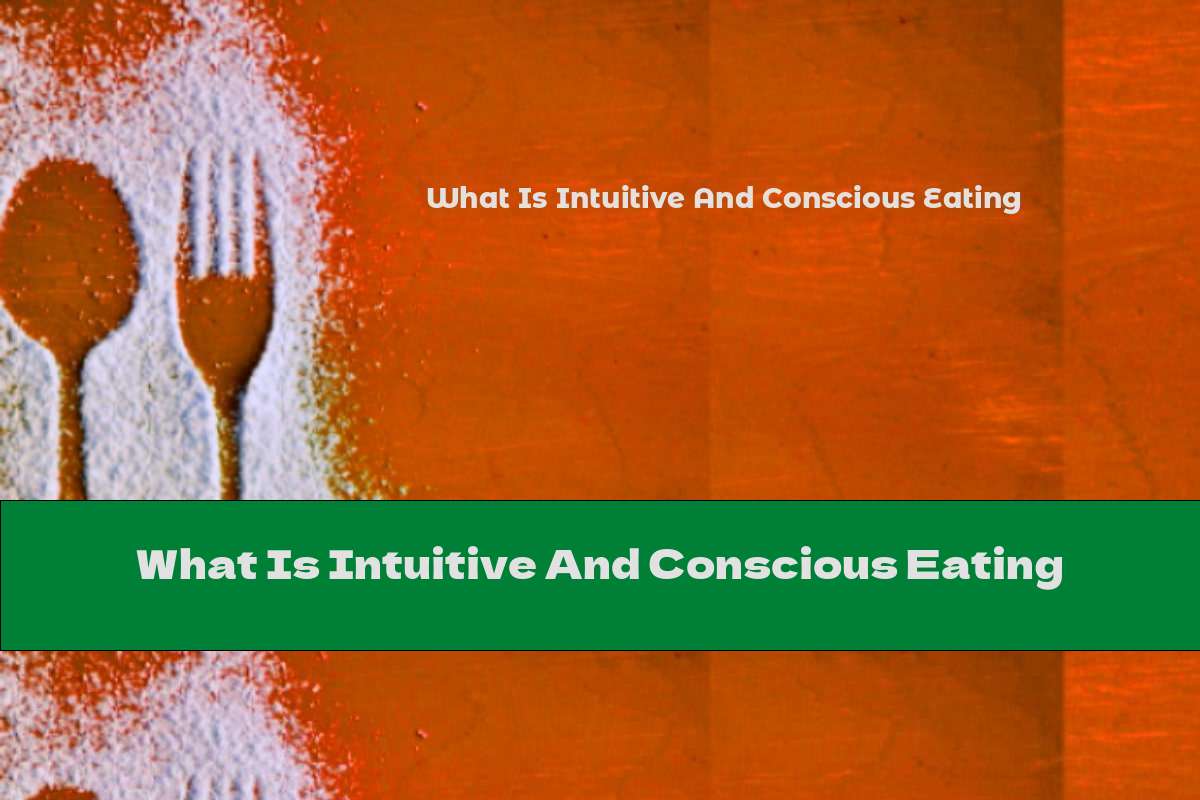What Is Intuitive And Conscious Eating
 Author: Dean Rouseberg
Time for reading: ~6
minutes
Last Updated:
February 21, 2026
Author: Dean Rouseberg
Time for reading: ~6
minutes
Last Updated:
February 21, 2026

Do you think intuitive and mindful eating are the same thing? There are many similarities, but still.
You have probably already heard about intuitive eating . To eat intuitively means to choose the food about which the body signals, to start eating when hungry, to finish when full. Have a pleasant (not exhausting) physical activity. Give up diets and dietary thinking. As long as a person believes that there is a miracle diet, intuitive eating does not work.
Conscious nutrition does not put the refusal of diets in the first place - and this is its main difference from intuitive . With conscious nutrition, you can even drive yourself into limits and restrictions. The main thing is that you understand and approve the meaning of what is happening.
What is intuitive eating ?
We are all born with a predisposition to intuitive eating . We simply do not know any other purpose of food , except for meeting the needs of the body. Eating to maintain a conversation, eating to demonstrate status, eating for pleasure or eating as a religious ritual - all these are formed later. When we are taught to eat correctly (according to certain rules), our eating ceases to be intuitive and becomes conscious .
In the 30s of the last century, an experiment was conducted in Germany: a kindergarten was organized, where children from 8 to 11 months old were recruited - that is, those who had just switched from breastfeeding to solid food . At first, in the kindergarten, different food was put on the table: raw and stewed vegetables, fish, meat, poultry, sweets - and children could choose and eat what they wanted and as much as they wanted. Those who could not walk or eat were cooked, but only with what the child did not refuse and what showed interest. As a result, it became obvious that the child, not limited by the rules, eats approximately the same number of calories per day, but gains them at the expense of different products: today he wants soup, tomorrow - sweets. No one ate sweets all the time. 2 days maximum - and the child wants something not sweet. This may be of interest to parents who categorically forbid their children from cookies.
The kindergarten existed for 6 years - until the pupils went to school. Pediatricians stated that there were no more healthy and balanced babies in their practice. In 6 years, the children were sick 3 times.
The body knows what it needs to strengthen itself. The main thing is not to distract him while eating . You cannot combine lunch with TV, Facebook, or a newspaper. When eating, you need to feel what you are eating with your whole body.
What affects intuitive eating
Everything changes when we are convinced that we need to eat first, second and compote. Moreover, in exactly this sequence. But no one can clearly explain why this is so. However, do not eat sweets before dinner and do not get up from the table until you have eaten everything - the main enemies of intuitive eating . Then there is a constant lack of time and we eat on the go. Even later, we combine food with work and entertainment - and very quickly we stop understanding ourselves and our needs.
Emotions begin to prevail over physiological needs, we gradually stop distinguishing hunger from the desire for pleasure.
-
Eye hunger: saw a beautiful cake - wanted.
-
The hunger of the nose: it is especially felt in fragrant bakeries or departments of the store with smoked products - we go for the smell.
-
Emotional hunger: the desire to get pleasure or compensate for negative emotions at the expense of pleasant tastes.
Real hunger is felt in the stomach. But local residents often don't have time to feel it: their stomachs are filled with the desire of their nose and eyes. And then they wonder: as if they haven't eaten anything - but where did the extra weight come from?
What is conscious nutrition
Conscious nutrition is a part of intuitive . And the return road to it. Start by not being distracted while eating . Single-tasking is the main principle of mindfulness. Food means food , without TV and negotiations. While eating, you are already busy - you need to listen to yourself, your body's signals, understand what is happening with taste.
Conscious nutrition comes at the age when we have already spoiled a lot in the body, so it, unlike intuitive , is ready to coexist with certain restrictions.
Conscious nutrition can be organized from a certain set of products. For example, you are vegetarian or vegan. Or eat only kosher food . Or you've had your gallbladder removed - and you can't afford fatty and fried food. After all, intuitive eating is also limited to a certain set of products: if you have never tasted lychees or quinoa in your life, then it is unlikely that your body will demand them.
Related Articles
- The Ultimate Guide to Hickory Smoked Bacon in Nutrition and Healthy Eating
- The Ultimate Guide to Nutritional Eating: Importance, Key Nutrients, Benefits, and Recipes
- The Ultimate Guide to Creating a Well-Balanced Diet Plan
- The Truth About E477 in Food: What You Need to Know
- The Nutritional Value of Potato Chips: What You Need to Know